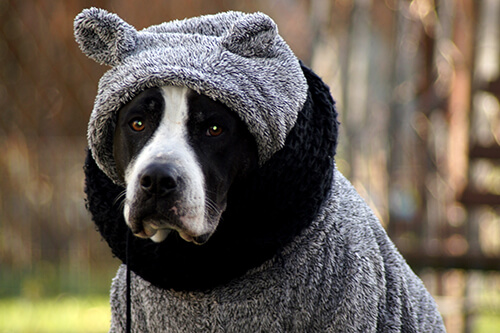The days are growing shorter and colder, and it’s getting to that point where you wouldn’t consider stepping out of the house without your sweater or coat. For many pet owners, the natural next question is “Does my dog need a sweater for winter, too?”
Before you go out and buy your dog the fluffiest down coat on the market, consider a few of these tips for keeping your pup cozy and comfortable all winter long.
Size
The bigger the dog, the more muscle mass they have – and therefore the more heat their body can produce. For this reason, large healthy dogs typically don’t require a jacket in normal winter conditions.
Small dogs tend to benefit from extra insulation during the winter, as they have a harder time retaining body heat. Medium or large dogs who have lost muscle mass due to age or illness may also need sweaters to help them retain the heat they do produce.
Breed
Size is not the only factor that can determine whether or not your dog needs a coat for winter. Certain breeds are more prone to becoming uncomfortable during cold weather due to their body shape or activity level.
For example, breeds with thin body types such as Greyhounds and Whippets usually benefit from sweaters during winter. Likewise, breeds with short legs – like Corgis and Basset Hounds – may need outerwear to protect their bodies from the cold snowy ground.
If your dog’s breed comes from a warmer climate or does not tend to be very active outdoors, they may need a sweater as well. This is why you see many Great Danes wearing sweaters during the winter!

Fur/Hair Type
Dog breeds with thick, heavy, long coats (such as Alaskan Malamute, Golden Retriever, or Great Pyrenees) typically do not need sweaters or coats during the winter. Their fur is usually enough to keep them warm and cozy.
On the other hand, short-haired dogs have less natural insulation from the outside environment, and can quickly become too cold in winter conditions. A jacket (and booties) can keep your short-haired pup more comfortable on walks.
Other Factors
Your dog’s general health can also determine whether or not they need a winter sweater. Dogs who are elderly or sick are generally more sensitive to extreme temperatures, and may require more insulation. If your pup suffers from arthritis or other joint conditions, a coat can help make them more comfortable.
The amount of time you spend outside and the activity level of your dog will also make a difference. For instance, a dog who is playing and racing around at full speed will stay warmer than a dog going on a leisurely walk.
In general, even if your dog doesn’t need a coat to stay warm, it almost never hurts. A light coat can help even the fluffiest breeds stay dry and clean while playing in the snow on their outdoor adventure.
Signs of Hypothermia in Dogs
If you are playing outside with your dog and notice any of the following warning signs of hypothermia, bring them inside right away. Dry them off with a towel and help them warm up with a blanket.
We also recommend calling your vet to make sure your dog is not suffering from severe symptoms, and to determine whether expert treatment is needed.